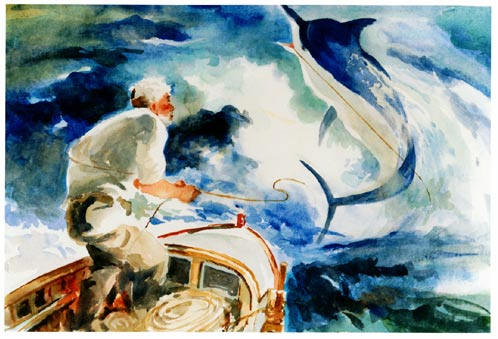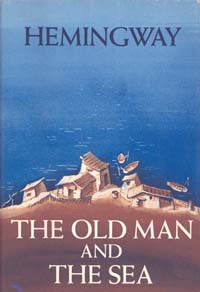Hi fellows,
today I'm going to write my first blog entry about literature. I am forcing myself to read more, especially during the holidays, so I will be writing book reviews and adding them to the blog.
The first book I've read is Hemingway's The Old Man and the Sea. It is one of Hemingway's masterpieces. Set in the Gulf Stream off the coast of Havana, it depicts life at sea and the everyday adventures of fishermen really accurately.
The main character, Santiago, is an old fisherman, nicknamed "el salao" because he hasn't been able to catch a fish for eighty-four days. He has a young apprentice, Manolín. However, Manolín is forbidden by his parents to fish with the old man because of his bad luck at fishing.
 One day, the old man goes fishing on his own really far, convinced that his unlucky days will be over, and he is damn right. An enormous marlin bites the bait. However, it is such an enormous fish that it pulls the old man's skiff for three days. During that time, the old man, must survive, feed on the food he can find at sea, try to pull the marlin in spite of his backache, tired sight and a cramped hand to come back home where he expects to gain reputation and feed a lot of people. However, the way back home will be difficult...
One day, the old man goes fishing on his own really far, convinced that his unlucky days will be over, and he is damn right. An enormous marlin bites the bait. However, it is such an enormous fish that it pulls the old man's skiff for three days. During that time, the old man, must survive, feed on the food he can find at sea, try to pull the marlin in spite of his backache, tired sight and a cramped hand to come back home where he expects to gain reputation and feed a lot of people. However, the way back home will be difficult...
The book explores different themes. The most important one might be the love for nature and the sea forces. Santiago loves all the fish. He conceives the sea as a powerful entity that can provide everything he needs: food, bait, pleasure and beauty. In fact, he describes the sea as being feminine: "the old man always thought of her as feminine and as something that gave or withheld great favours."
Santiago not only admires the sea, but all its creatures. Every time a fish appears, he uses the pronoun 'he' instead of 'it'. His fight with the marlin can be considered a fair fight; he admires him and he regrets killing him.He somehow creates a bond with the marlin stronger than the bond created with his fellow fishermen in the harbour. He even admires the sharks that attack him ! All the sea animals are like "brothers" to him. “It is good that we do not have to try to kill the sun or the moon or the stars. It is enough to live on the sea and kill our true brothers.” However, not everything at sea is beautiful. Santiago is all alone; the book refers to the loneliness of fishermen. He is always speaking alone and wishing his apprentice to be with him. During all his voyage, he is isolated and erratic; it could be deemed he even begins to be insane.
Another theme dealt with in the book is the relationship between Santiago and Manolín. There is a master-disciple connection. Manolín admires his mentor even though he hasn't fished anything for too long. He stands by him, he helps him in the chores, provides him with food and drink and , what is more important, accompanies him. Santiago, in return, is humble and also admires his disciple. He misses him when he is not with him. Their relation reminds me of the old grandfather-grandchild relation, when grandchildren spent time with their grandparents and learnt from them.
Another theme the book mentions is the treatment of the elderly. Santiago is an experienced fishermen with injuries and scars quite able to teach youngsters how to fish. However, most of the fishermen makes fun of him, This reflects the way in which the elderly are treated every day. They are considered burdens and obstacles instead of a source of wisdom and mastery; they are neglected, isolated and abandoned. Santiago lives in a little shack and he barely gets by to survive. Unfortunately, that is what we do with our elderly now: we lock them up where they cannot mess up with us. The only character that respects him is Manolin, who sees Santiago as a true, experienced fisherman. He prefers his company to anybody else's.
To conclude, I have enjoyed this book because in such few pages, Hemingway manages to outstandingly describe life at sea in detail (it is clear that he knows the fishing world very closely), and he evokes sympathy for the main character, Santiago, a man that, old though he is, he thrusts his way to successfully achieve his goals, respecting the sea and the sea animals. I have also loved the subtle critique of the man's bestiality. The man is a creature that must endure: “ man is not made for defeat. A man can be destroyed but not defeated.” Hemingway somehow manages to keep us waiting to see what happens in the same way that fishermen await to catch the fish. Although the plot could be a bit more riveting in my opinion, this book fulfilled all my expectations and I strongly recommend you to read it.
P. S. Here you can have a look at the other reviews I have written : Golding's The Lord of the Flies; Robinson Crusoe by Daniel Defoe and Oliver Twist by Charles Dickens
P. S. Here you can have a look at the other reviews I have written : Golding's The Lord of the Flies; Robinson Crusoe by Daniel Defoe and Oliver Twist by Charles Dickens



No comments:
Post a Comment